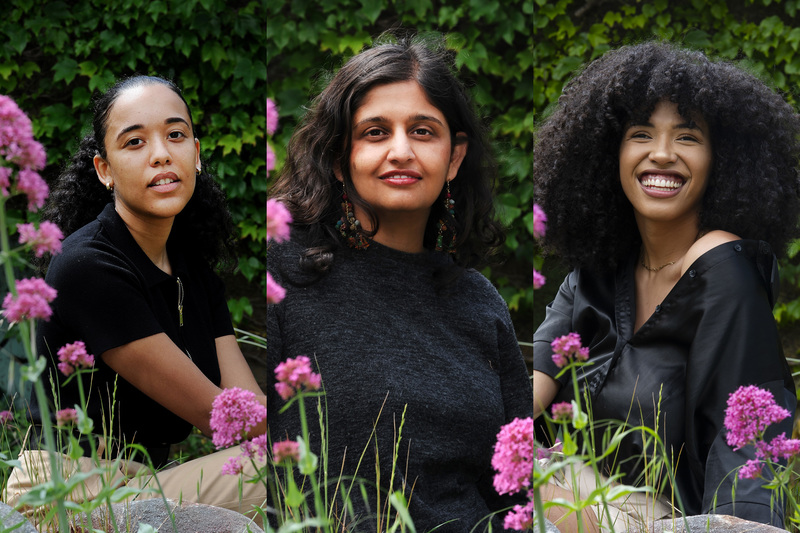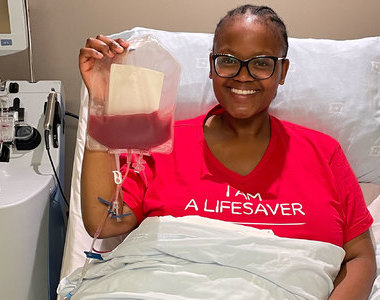Femmeact: vital support for women in actuarial science
02 November 2020 | Story Helen Swingler. Photo Lerato Maduna. Voice Neliswa Sosibo. Read time 9 min.
Gender disparity in actuarial science at universities and in the workplace is a larger issue than number parity. Women are essential role models in a field lagging in representation. They also offer vital perspectives in a world where bias often undermines women in the design of everything – from healthcare products to pension benefits.
But the University of Cape Town’s (UCT) student-led Femmeact is working to change that.
Femmeact is an initiative to support women in the field, both at university and the workplace. It was relaunched recently in the actuarial science section of the commerce faculty after a hiatus of several years. Thanks to the UCT Actuarial Science House Committee’s Ciara Madella, a final-year student; third-year student Cara Geduld; and the former head of the actuarial science department Shivani Ranchod, Femmeact is back on the map.
The numbers of women students and professional actuaries are starting to shift, but Ranchod said that they’re a long way away from a 50/50 representation.
Webinar to honour women
Femmeact has links with the Actuarial Society of South Africa (ASSA), the Association of South African Black Actuarial Professionals (ASABA), and the Actuarial Women’s Committees (AWCs) within those organisations.
In August and September Femmeact presented a four-part webinar series to honour women in the actuarial science space. ASSA, ASABA and the AWCs provided substantial support and promotion. ASSA also provided the webinar platform.
“Femmeact’s main mission is to give women students a platform.”
Participants included top women actuaries, who shared their challenges and career experiences. Speakers included Roseanne Harris, the former president of ASSA and the International Actuarial Association president nominee; Memory Zimba, the president of ASABA; and Nabeelah Kolia, the chairperson of ASABA’s Actuarial Women’s Committe.
Topics focused on gender and sexuality, decision-making as a woman, taking charge of your career and finding balance between and within work, actuarial studies and home life.
“Femmeact’s main mission is to give women students a platform,” said Geduld. “We also wanted to tackle topics that arenʼt spoken about to create a greater understanding of what actuarial science is about and to give students role models that they can look up to.”
Ranchod added: “It’s a space where it’s so difficult to come across role models … women who look like you, speak like you, you know, where you can imagine: That could be me one day.”
Geduld mentioned the example of a young Muslim student she tutors who asked for a speaker’s contact details.
“Because the speaker was Muslim … she could relate to her culture and her religion and how she navigated those elements in her actuarial studies.”
“Because the speaker was Muslim … she could relate to her culture and her religion and how she navigated those elements in her actuarial studies.”
Madella found herself taking notes during the sessions, gathering information and tools and imagining how she might respond in certain situations.
“Quite a few people reached out to tell me the same thing. There was a lot of success and good stories and good sentiment that came from it.”
Lived experiences
Madella and Geduld have come from very different backgrounds – Madella educated at a prestigious girls’ school in Cape Town, Geduld at a co-ed school in Port Elizabeth. But both shone at maths, and actuarial science ticked the box.
At UCT Madella found that Geduld was “very invested in the kinds of issues” that women students experience and roped her into relaunching Femmeact.
“Cara has powerful experiences to share with other women,” she said.
Actuarial science demands a lot from students and Geduld said that she had had to face numerous obstacles; university had not been a smooth ride. At the end of her second year she was sexually assaulted during the time of the Fees Must Fall activism.
“It made me see that [actuarial science] can be used as a tool in bettering a lot of people’s lives, such as in healthcare. I could see the value.”
“And because of that, and because of the person that I am, I threw myself into the Fees Must Fall movement unfolding at the time. I was overcommitted to it, almost as though I was running away from my own problems so that I could give more of myself to helping others. So, I think my empathy levels are very high.”
In 2017 she took a year off. She returned home to heal with crucial medical and family support. But the experience almost scuppered her student career.
A vacation job at Old Mutual prior to that year off proved to be the deciding factor. The team there tailored the experience to her needs, feeding her ideas and research that wasn’t solely “maths and numbers”.
“And that kept me inspired. It made me see that [actuarial science] can be used as a tool in bettering a lot of people’s lives, such as in healthcare. I could see the value.”
Inequality’s complex history
Inequality in the field has a long and complex history, said Ranchod – from the time children are socialised into gender groups, the subjects they take at school, the narratives around what boys and girls are good at and what they should be doing.
“That filters through into the pool of students that the university programme recruits from. And then, of course, we lose women at every step of the journey for a range of reasons: stereotypes, role models, self-belief and the internalisation of failure.”
The last reason is interesting. Research at UCT shows that failure rates for tests are high. But men and women students respond differently – men putting poor marks down to a bad test, women internalising their results as failure, a sense of “I’m not cut out for this”.
“The research shows that women in actuarial science are not necessarily dropping out because theyʼre failing, but voluntarily leaving because of those internalised feelings,” said Ranchod. The irony, she added, is that by the time women get to board exams and the workplace, they outperform men.
“The women who survive really thrive.”
“Those later exams draw on language skills and ability to join dots across different areas; [they tap] into broader thinking skills. So, the skills mix shifts from undergraduate to postgraduate studies. I guess itʼs a selection bias, and the women who survive really thrive.”
Survival is part of Femmeact’s mission: retain women students and ensure they survive into the profession – and as academics. Sadly, UCT has recently lost all three female lecturers to other opportunities.
Geduld recalled her own experiences. She was more comfortable asking a woman lecturer for answers or she approached a statistics lecturer for help because he was a man of colour, “someone I could relate to”.
Ranchod believes Femmeact will go a long way to alleviating these problems.
“Itʼs so important because itʼs such a lonely journey. There’s something so normalising about having these conversations.”
Invisible women
What do women bring to the workplace?
“Our lived experiences or things that men donʼt think about,” said Geduld.
Ranchod agreed: “Itʼs a very cerebral profession. Because of the mathematical sort of nature of it, [it] attracts people who are very cerebral. Women are, I guess, given permission to be more head–heart integrated than men are. And thatʼs so necessary.”
“Letʼs look at men’s and women’s roles and inputs and then design financial structures and products that reflect the society we actually want.”
There’s also the question of bias in models and statistics – whether it’s unconscious bias or not. Here Ranchod cited Caroline Criado Perez’s book Invisible Women: Exposing data bias in a world designed for men, which describes all the ways women are missing from data and how that impacts the way that societies benefit and products are designed.
“Iʼve worked in healthcare and health insurance all my career and Iʼm only now starting to realise the extent to which womenʼs health is not represented in the design of medical scheme benefits. Contraception is not an insurable cost, nor menopause benefits. We basically just ignore the fact that half the population is engaging with their healthcare in a particular way every month.”
This carries through into almost every facet of long-term planning; in examples of pension funds, which donʼt consider the fact that women spend more years caregiving, they have less time to contribute to their pension funds and they live longer on average.
“We need to step back,” said Ranchod. “Letʼs look at men’s and women’s roles and inputs and then design financial structures and products that reflect the society we actually want. If you donʼt have women involved, that [perspective] just goes missing.”
 This work is licensed under a Creative Commons Attribution-NoDerivatives 4.0 International License.
This work is licensed under a Creative Commons Attribution-NoDerivatives 4.0 International License.
Please view the republishing articles page for more information.
Listen to the news
The stories in this selection include an audio recording for your listening convenience.























































































































































































































































































































































































